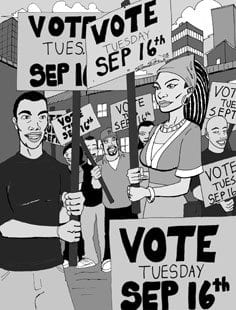
It’s your duty
In his stirring keynote address at the 2004 Democratic National Convention in Boston, Barack Obama said, “There is not a black America and a white America and Latino America and Asian America — there’s the United States of America.” Those at the convention enthusiastically supported this call for national unity. However, there is a subtext to those remarks that cannot be ignored.
America is a nation of immigrants. Even the Africans who came as slaves were involuntary immigrants. It is natural that those sharing the same ethnic heritage would associate for their common good. Yankees, Italians, Irish, Jews, Chinese, Latinos and blacks all organized as ethnic groups to improve their status in America.
There are two sources of secular power in America: votes and dollars. People who vote are able to exert a strong influence on governmental policy. Supportive government policies can also clear the way for building wealth.
Not everyone could march in the civil rights movement, but everyone can march to the polls to vote at every opportunity — including the preliminary election being held this coming Tuesday, Sept. 16. Those who fail or refuse to do so should expect that the clan has no further obligation to be concerned about their welfare. Voting should be a matter of ethnic pride as well as a national obligation.
“Executive Warfare”
To many Americans, the executive suites of major corporations are exotic, mysterious places — architecturally perfect, well-appointed symbols of wealth and power. Every day, the denizens of these suites develop strategies and make decisions involving tens of millions of dollars and the jobs of thousands of employees.
Former John Hancock Financial Services CEO David F. D’Alessandro provides a guide on traversing the minefield of corporate competition at the “C” level (chief executive officer, chief financial officer, etc.) in his recently published book, “Executive Warfare: 10 Rules of Engagement for Winning your War for Success.”
Each of the 10 chapters begins with a pithy quotation that sets the tone for what is to follow; an appropriate quotation for the work on the whole might be President Calvin Coolidge’s remark, “The business of America is business.” This notion seems to be part of the DNA of most Americans. A poll on this point might reveal that most adults would prefer to be Bob Kraft, owner of the Patriots, rather than Tom Brady, the team’s star quarterback. People recognize the difference between celebrity and sustained business achievement. “Executive Warfare” is a worthwhile read for all who are interested in the latter, not only those headed toward the upper echelons of corporate America.
D’Alessandro’s description of life in the executive suite destroys the sacred American adage, “There is always room at the top.” He details the brutality of the tactics employed by executives trying either to depose the king or eliminate other pretenders to the throne. “The top,” it turns out, is a very perilous place to be.
Anyone with the ambition to secure a post in the executive suite, even if he or she is just starting at the bottom, would do well to read “Executive Warfare” to develop an early understanding of how the game is played by the intelligent, astute adversaries they will encounter at the top.






